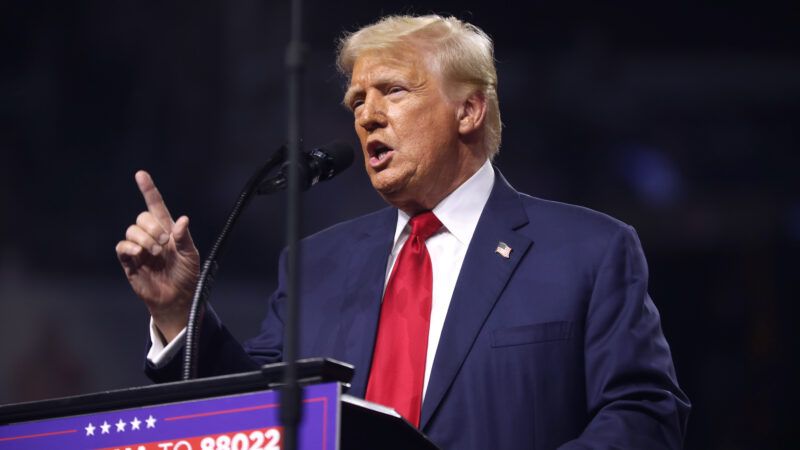Trump's Proposals Would Add $5.8 Trillion to the Deficit
Vice President Kamala Harris would add about $2 trillion to the deficit.

The major proposals pitched by the campaigns of Vice President Kamala Harris and former President Donald Trump would both expand the federal budget deficit—though Trump's plans would require significantly more borrowing over the next decade.
Trump's proposals would add an estimated $5.8 trillion to the deficit over the next decade, according to the Penn Wharton Budget Model, a fiscal policy think tank at the University of Pennsylvania (Trump's alma mater). Most of Trump's deficit-increasing policies result from proposed changes that would reduce Americans' tax burden. He's called for permanently extending the 2017 tax cuts, which would add an estimated $4 trillion to the deficit over the next decade (unless Trump comes up with offsetting spending cuts). His plan to eliminate taxes on Social Security benefits will add another $1.2 trillion.
Harris, meanwhile, rings up an estimated $1.2 trillion in larger deficits over the next decade, primarily by increasing government benefits.
She supports expanding the Child Tax Credit and other welfare benefits delivered via the tax code, which would add $2.3 trillion to the deficit over a decade, according to the Penn Wharton analysis. However, her plan to increase the corporate income tax would offset some of that deficit spending by hiking federal revenues by around $1 trillion.
The biggest difference between the two estimates is the dynamic consequences of Trump's and Harris' tax plans. The tax cuts proposed by Trump would boost economic growth and offset some of the costs of his other proposals. When those consequences are taken into account, the Penn Wharton estimates show that Trump would add merely $4.1 trillion to the deficit over a decade. Harris' proposed tax increases naturally have the opposite impact. As a result, she would add about $2 trillion to the deficit when the economic effects are included.
There is one huge missing piece in the Penn Wharton estimate, which fails to account for the potential costs and fiscal impact of Trump's proposed tariff hikes. The group says that is unable to model that because "key implementation details" are missing, such as what products would be subject to the tariffs and how high the import tax rates would be. "While new import taxes and tariffs could raise several trillion dollars in new revenue over the next decade, they could also lead to revenue losses due to potential retaliatory actions from other governments and other economic dynamics," the Penn Wharton report warns.
It doesn't take an advanced economic analyst to realize that neither Trump nor Harris seem interested in reducing the federal budget deficit. Indeed, Trump borrowed more than $8 trillion during his four years in office, and Harris has been complicit in the Biden administration's efforts to borrow another $4.3 trillion over the past four years. There has been little discussion on the campaign trail of cutting spending or trying to balance the budget (or even stabilizing the debt), even though polls show that voters are worried about the potential consequences of more borrowing.
Some conservatives and libertarians might argue that Trump's deficit-hiking policies should be more acceptable because he's aiming to produce greater economic growth. That might be true if the budget weren't already so wildly out of whack, or if Trump provided some indication that he'd be interested in cutting government spending to offset his planned reductions in future tax revenue.
For now, however, both Trump and Harris are effectively promising to continue the foolish status quo of the past few decades: Giving Americans a more expensive government than we are paying for, and putting the tab on the next generation.


Show Comments (129)